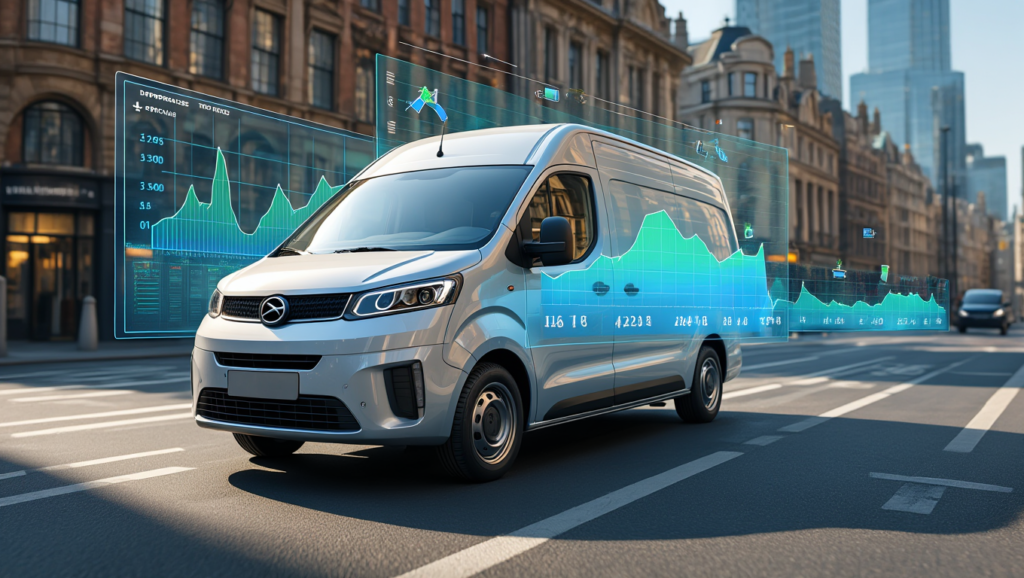
Electric vans are becoming a common sight on UK roads these days. With more businesses looking to cut fuel costs and reduce their carbon footprint, it’s no surprise that electric vans are gaining popularity. But like any vehicle, electric vans lose value over time – and understanding this depreciation is really important if you’re thinking about buying or selling one.
In this blog, we’ll take a straightforward look at how electric vans hold their value after three years on the road. We’ll break down what affects their resale price, look at current market trends, and explain how this all matters to you as an owner or potential buyer.
Whether you’re weighing up the long-term costs of an electric van or thinking about selling one you already own, this guide will help you understand what your vehicle might be worth down the line.
Understanding Electric Van Depreciation
What is Electric Van Depreciation?
Put simply, depreciation is how much value your van loses over time. All vehicles lose value as they age, but electric vans follow some different patterns compared to diesel or petrol vans.
EV residual value – that’s the amount your electric van is worth after a period of ownership – can vary quite a bit. Some electric vans hold their value better than others, and understanding this can save you money in the long run.
When we talk about depreciation, we’re usually looking at the difference between what you paid for the van and what you could sell it for now. For most vehicles, the biggest drop in value happens in the first three years.
Factors Affecting Electric Van Value
Several things can affect how much your electric van is worth when you come to sell it:
- Battery condition: The battery is the most expensive part of an electric van, so its health directly impacts resale value. Most manufacturers offer battery warranties of 8 years or 100,000 miles, which helps protect value.
- Mileage: Just like traditional vans, the more miles on the clock, the lower the value.
- Model and make: Some brands hold their value better than others. For example, Nissan and Mercedes electric vans tend to retain value well.
- Technology: Electric vehicle technology is still developing rapidly, so newer models with better range and features can make older ones seem outdated quickly.
- Market demand: As more people want electric vans, used prices can be affected by supply and demand.
- Government policies: Changes to incentives, road tax, or clean air zones can all impact how desirable electric vans are.
Analysing the 3-Year Resale Value of Electric Vans in UK
Overview of Electric Vehicle Value after 3 years
Most electric vans lose between 40-60% of their value in the first three years. This might sound like a lot, but it’s actually comparable to (and sometimes better than) diesel alternatives.
Three-year electric van worth varies by model. For example, the Nissan e-NV200 tends to hold around 45% of its original value after three years. Meanwhile, the Mercedes eVito might keep closer to 50% of its initial price.
What’s interesting is that as the technology becomes more established and battery life concerns diminish, we’re seeing electric vans starting to hold their value better than they did five years ago.
Electric Van Appraisal: How is it done?
When valuing an electric van, appraisers look at several key things:
- Battery health and remaining capacity
- Service history and maintenance records
- Physical condition inside and out
- Charging equipment included
- Remaining battery warranty
- Updated software and compatibility with charging networks
- Any additional features or modifications
Professional appraisers use market data and recent sales figures to determine fair used electric van prices. If you’re curious about your van’s current value, our company offers a same-day free quote service that takes all these factors into account.
Market Trends Affecting Electric Van Depreciation
Current Trends in Electric Van Market
The electric van market in the UK is changing fast. Here’s what we’re seeing:
- Growing demand: More businesses are switching to electric, boosting resale values.
- Expanding charging infrastructure: As charging points become more common, electric vans become more practical and desirable.
- Longer ranges: Newer models can go further on a single charge, which can make older models with limited range less attractive.
- Clean Air Zones: More cities introducing charges for polluting vehicles is making electric alternatives more appealing.
- Lower running costs: As fuel prices rise, the savings from running an electric van are becoming more significant.
These trends generally help support used electric van values, but they can also make older models with outdated tech or shorter ranges lose value faster.
Comparing Electric Van Models
Different electric van models hold their value differently after three years:
- Nissan e-NV200: One of the more established models, it tends to hold value reasonably well due to its reliability and brand reputation.
- Renault Kangoo Z.E.: These typically lose value a bit faster, but lower initial purchase price can make them good value used.
- Mercedes eVito: Premium brand status helps these maintain stronger residual values.
- Vauxhall Vivaro-e/Peugeot e-Expert/Citroen e-Dispatch: These newer models (which share the same platform) are showing promising signs for value retention.
Larger vans with bigger batteries (and therefore longer ranges) typically hold their value better than smaller models with limited range capabilities.
How Cash Your Vans Can Help
Our Services
At Cash Your Vans, we understand the ins and outs of electric van depreciation, and we use this knowledge to give fair prices for all types of vans.
We buy:
- Electric vans of all ages
- Non-runners with battery or motor issues
- Vans that have failed their MOT
- High-mileage electric vans
- Vans with cosmetic damage
We don’t mind what condition your van is in – we’ll make you an offer regardless. Whether your electric van is in top shape or has seen better days, we’ll give you a fair price based on its current market value.
Why Choose Cash Your Vans
Our team keeps up with all the latest electric van market trends, which means we can offer prices that reflect the true value of your vehicle. We don’t use generic valuation tools – we look at each van individually.
With us, you’ll get:
- A same-day free quote on any electric van
- No obligation to sell
- Quick payment if you do decide to sell
- Free collection from your location
- All paperwork handled for you
We make selling your electric van straightforward and hassle-free, with no hidden fees or last-minute price changes.
Conclusion
Understanding electric van depreciation is important for both buyers and sellers in today’s changing market. While electric vans do lose value over time like any vehicle, they often follow different patterns than traditional diesel vans.
After three years, most electric vans will have lost around half their value, though this varies widely depending on the model, battery condition, and market trends. As the technology becomes more mainstream and range anxiety decreases, we’re likely to see used electric van values stabilize.
Whether you’re considering buying a new electric van and wondering about future resale value, or looking to sell your current electric vehicle, keeping an eye on these trends will help you make smarter financial decisions.
Ready to Sell Your Electric Van?
If you’re thinking about selling your electric van, we’d love to help. Our team at CashYourVan offers free, no-obligation quotes that take into account all the factors we’ve discussed in this article.
Get in touch with us today:
Phone: 08001182088
Email: info@cashyourvans.com
Online: Fill out our quick quote form at https://cashyourvans.com/
We’re ready to give you a fair price based on current market conditions, whatever the age or condition of your electric van.



